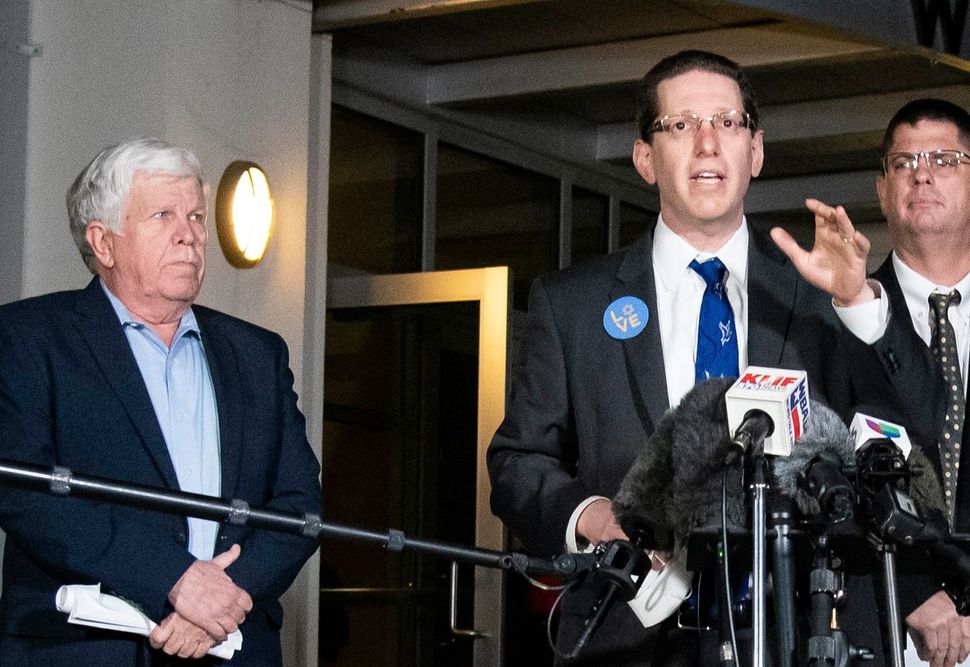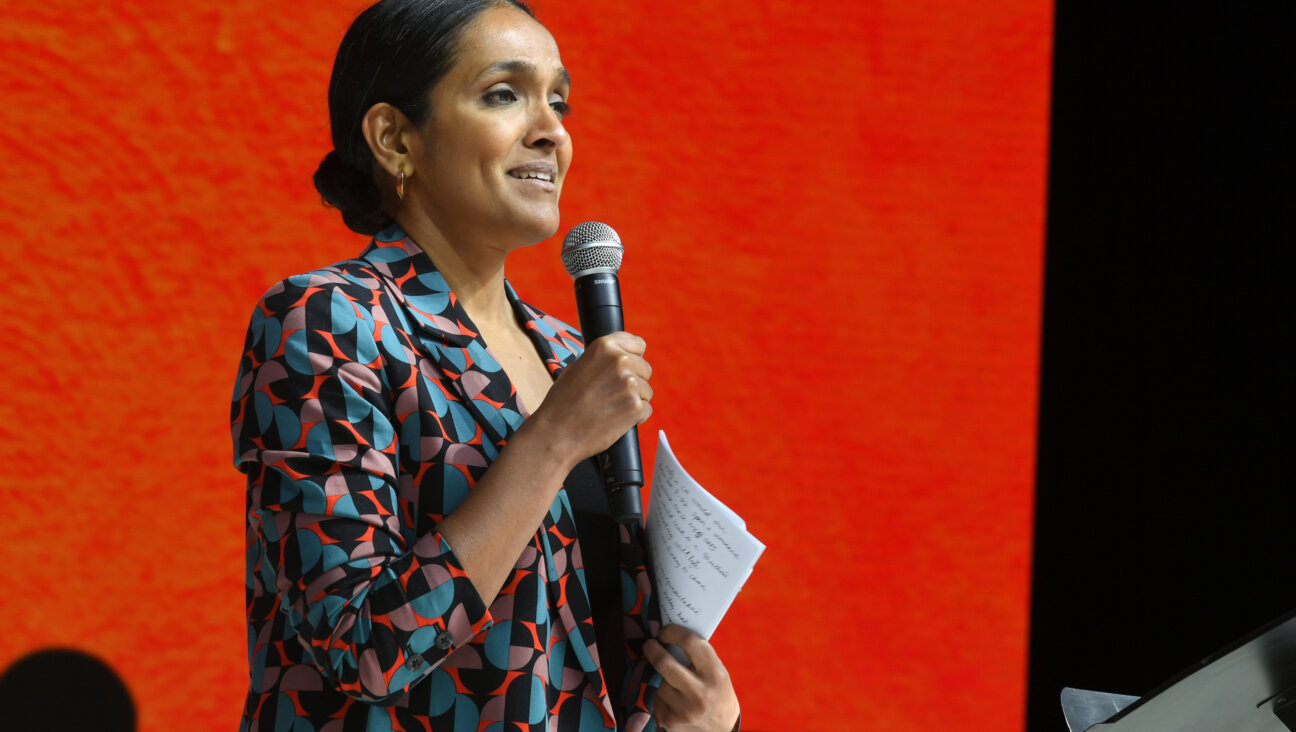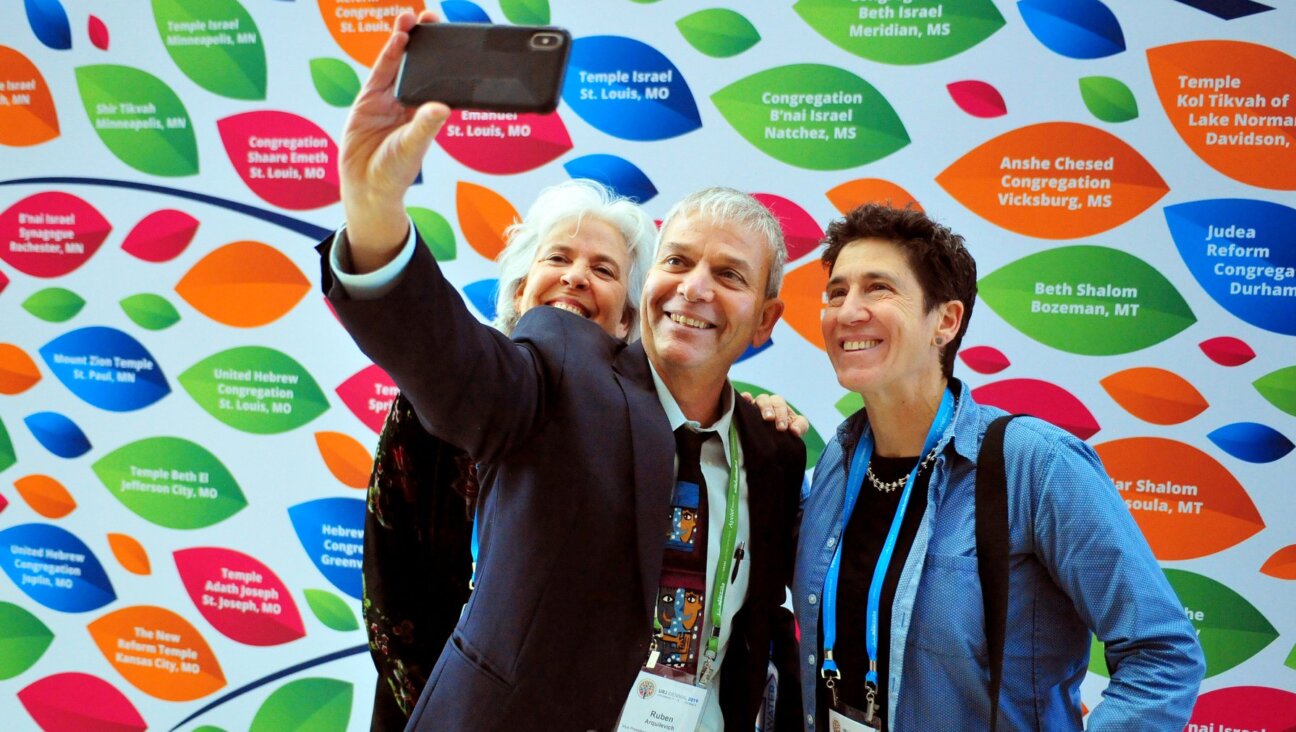North Carolina synagogue expected to hire rabbi taken hostage in Texas

Rabbi Charlie Cytron-Walker By Emil Lippe/Getty Images
A North Carolina Reform synagogue plans to vote Thursday night on hiring Rabbi Charlie Cytron-Walker, who became an international hero after being taken hostage in his Texas synagogue during Shabbat prayer services last month.
Gayle Goldsmith, a 20-year member of Temple Emanuel in Winston-Salem, N.C., said in an interview Wednesday that she and others met with Cytron-Walker two weeks ago and that he is poised to replace Rabbi Mark Cohn, who has served the congregation since 2001. “I think everybody was very happy with him,” Goldsmith said about Cytron-Walker’s visit.
“I thought he was great,” she added. “He’s just got so much to offer.”
Two other congregants, who spoke on the condition of anonymity, confirmed that there is a Zoom meeting scheduled for Thursday, open only to congregants, to discuss hiring Cytron-Walker, one of three finalists for the job.
Cytron-Walker resigned as rabbi of Congregation Beth Israel in Colleyville last fall after the congregation’s board voted not to renew his contract.
Rabbis Cohn and Cytron-Walker did not immediately respond to requests for comment on Wednesday.
Winston-Salem’s lone synagogue
Temple Emanuel is the city’s only synagogue. The congregation was founded in 1932 after breaking away from an Orthodox congregation that was established by immigrant merchants who arrived in the city in the 1880s. The smaller Orthodox congregation closed down in the 1980s. Temple Emanuel now has an estimated 280 membership families that make up 600 people.

Shabbat services at Temple Emanuel in Winston-Salem, North Carolina. Image by Screenshot
Its longtime spiritual leader, Rabbi Mark Cohn, is expected to retire in June after 21 years.
Cohn started his job at Temple Emanuel three months before the Sept. 11, 2001, terrorist attacks in New York City and Washington, D.C. He told the Winston-Salem Journal last August that his departure is, in part, due to his marriage with Rabbi Amy Wallk who leads Temple Beth El in Springfield, Massachusetts. Earlier this month, Temple Emanuel celebrated the rabbi’s aufruf, the traditional Jewish ceremony on the Shabbat before a wedding.
“I can’t imagine him retiring,” Goldsmith said about Rabbi Cohn. “He is a great rabbi and I am really sorry to see him go. There are going to be some big shoes to fill.”
A rabbi’s journey
Originally from Lansing, Michigan, Cytron-Walker grew up attending Congregation Shaarey Zedek in East Lansing. He graduated from the University of Michigan in 1998 and received his rabbinical ordination in 2006 after graduating from Hebrew Union College-Jewish Institute of Religion at the university’s Jerusalem and Cincinnati campuses. That year he joined Congregation Beth Israel as the synagogue’s first full-time rabbi.

Rabbi Charlie Cytron-Walker talks to reporters outside of Whites Chapel United Methodist Church following a special service on January 17, 2022 in Southlake, Texas. Image by Emil Lippe/Getty Images
Throughout Cytron-Walker’s 16 years at Beth Israel, he worked to build relationships with local school districts and organized interfaith events, such as a 10-year memorial service on the anniversary of 9/11.
Cytron-Walker announced his resignation in an email to his congregants in October after learning that the board of directors were planning to recommend against the renewal of his contract ahead of a congregational meeting required by its bylaws, to the disappointment of some congregants. Preempting the vote, Cytron-Walker announced he would leave when his contract expires in June of this year.
Cytron-Walker was already looking for a new job when the terrorist, Malik Faisal Akram, entered the synagogue during Shabbat morning services and held four hostages, including the rabbi, in a standoff that lasted around 11 hours.
In an op-ed for The New York Times on Wednesday, Rabbi Cytron-Walker wrote that despite his horrific experience with the attacker, whom he initially welcomed into his synagogue, “I remain committed to the idea of welcoming and caring for the stranger and living that value.”
He added: “If we begin with that love of the stranger, but offer it not in response to violence, but encouraged by empathy, we might just change our world.”
Benyamin Cohen and Rachel Hale contributed to this report.
A message from our Publisher & CEO Rachel Fishman Feddersen

I hope you appreciated this article. Before you go, I’d like to ask you to please support the Forward’s award-winning, nonprofit journalism so that we can be prepared for whatever news 2025 brings.
At a time when other newsrooms are closing or cutting back, the Forward has removed its paywall and invested additional resources to report on the ground from Israel and around the U.S. on the impact of the war, rising antisemitism and polarized discourse.
Readers like you make it all possible. Support our work by becoming a Forward Member and connect with our journalism and your community.
— Rachel Fishman Feddersen, Publisher and CEO
























